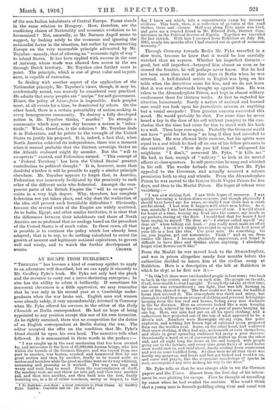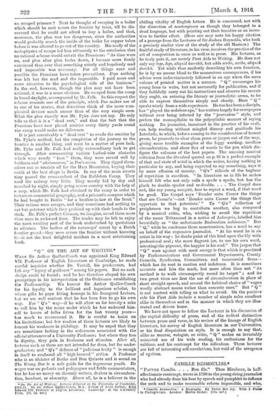AN ESCAPE FROM RUHLEBEN.*
" Trairmixo " has become a kind of courtesy epithet to apply to an adventure well described, but wo can apply it sincerely to Mr. Geoffrey Pyke's book. Mr. Pyko not only had the pluck and the resource to carry out a nerve-shattering enterprise ; he also has the ability to relate it brilliantly. If sometimes his irreverent cleverness is a little oppressive, we may remember that he was only in his second year as a Cambridge under- graduate when the war broke out. English men and women were already safely, if very uncomfortably, interned in Germany when Mr. Pyke offered his services to the editor of the Daily Chronicle as Berlin correspondent. He had no hope of being appointed to any position except this one of his own invention. As he rightly surmised, there was no competition for the duties of an English correspondent at Berlin during the war. The editor accepted the offer on the condition that Mr. Pyke's blood should bo upon his own head. The narrative tells what followed. It is summarized in these words in the preface :— "I was caught up in the vast mechanism that has been created by, and intervenes in the lives of 67,000,000 human beings, who live within the bounds of the German Empire, and was tossed from one part to another, was beaten, crushed and hammered first by one great section and then by another, finally to be tossed aside as useless and harmless while the great machine went on its way whirring, screaming and groaning as it worked. Tho way was long and weary and took long to wend. From the contemplation of itself, the machine took me and threw me into jail, and then into another jail, and then into another, and then back into the first, finally vomiting me, in a fit of either weariness, mercy or disgust, to this • To Ruhkben—and Bad : a Great Adventure in Three Phases. By Geoffrey tyke. London: Constable and Co. [4z. 6d. net.] day I know not which, into a concentration camp for interned civilians. This book, then, is a collection of pictures of the road thither, there and—thence. Half-way along Fate again was kind, and gave me a trusted friend in Mr. Edward Falk, District Com- missioner in the Political Service of Nigeria. Together we travelled the last stretch. With him I escaped from Ruhleben on July 9th, 1915, nearly ten months after I had started out in quest of economio necessity."
Through Germany towards Berlin Mr. Pyke travelled in a slow train, because ho knew that it would be less carefully watched than an express. Whether his imperfect German— good, but still imperfect—betrayed him almost as soon as he crossed the frontier, he will perhaps never know. But he had not been more than two or three days in Berlin when he was arrested. A half-finished article in English was lying on his table when the detectives came for him, and we do not learn that it was ever afterwards brought up against him. Ho was taken to the Alexanderplatz Prison, and kept in almost solitary confinement there for thirteen weeks. At first he regarded his situation humorously. Surely a nation of rational and learned men could not look upon his journalistic mission as anything but a venial escapade ! Then genuine concern succeeded this mood. He would probably be shot. For some time he never heard a key in the door of his cell without jumping to the con- clusion that the time had come for him to stand with his back to a wall. Then hope rose again. Probably the Germans would not have " paid for his keep " so long if they had intended to shoot him. He was allowed little exercise, but his spirits were equal to a snot which he fired off on one of his fellow-prisoners in the exercise yard. " How do you kill time ? " whispered his neighbour. " I don't," answered Mr. Pyke, " it kills me." He had, in fact, enough of " solitary " to look at its mental effects at close quarters. In self-protection he sang and whistled hi his cell. The warder forbade the noise. Then Mr. Pyke appealed to the Governor, and actually received a solemn permission both to sing and whistle. From the Alexanderplatz Prison he was moved to the famous S tadt Vogtei Prison for five days, and then to the Moabit Prison. His hopes of release were vanishing :- " I was now sinking fast. I saw little hopes of recovery. I was quickly becoming a broken-down creature, and though physically I should have lasted out for years, mentally I saw there was a crash not far ahead. I had seen it happen with other men before. As it was, mentally I was fast becoming a species of cow. I would stand for hours at a time, leaning my head into the corner, my hands in my pockets, staring at the floor. I would find that for hours I had been saying to myself My dear sir '—I always called myself ' my dear sir' when talking out loud,—' you really must make an effort to get out. I mean it's simply too stupid to spend the best years of your life in a box like this. Use your wits. Do something. Go on, you juggins, get out somewhere. Think ! ' and so on, from twelve till three. I became absolutely impersonal, and found it difficult to have likes and dislikes about anything. I absolutely forgot what flowers smelt like."
From the Moabit he was moved back to the Alexanderplatz, and was in prison altogether nearly four months before the authorities decided to intern him at the civilian camp at Ruhleben. Here is a description of the loft at Ruhleben in which he slept as he first saw it :—
" In this loft there were two hundred people in four rows ; two back to back in the centre, and one on each side. The people on the side, if tall, were unable to stand upright. To anybody awake at that time, the scene was extraordinary ; one light, that was left burning in case of fire, showed it up. The floor could not be soon for huddled forms that covered it. The atmosphere was thick and misty, but through it could be seen an avenue of clothing and personal belongings hanging from the low roof and beams, fading away into darkness in the far distance. Here an overcoat looked like a man hanging by the neck, relieved by the whiteness of a pair of pants hanging by one leg. Here, one man had put on all his spare clothing, and a cadaverous face projected out of the top of what appeared to bo a diver's suit. Numbers wore Norwegian ski-ing caps, like polar explorers, and nothing but frozen tips of rubicund noses projected from out the woollen oval. Some, on the other hand, had scattered their spare clothing, if they had any, underneath or over themselves, and shirts in great sprawling embraces hid many a poor shivercr. Occasionally a word or so of conversation drifted up from the other end, and all night long the doors at the end banged, with people going out to the latrines, and every time great flakes of wind-borne snow would rush in, and swirl about, finally settling down evanescent and wet on some huddled form. So close were we all that there was hardly any gangway, and heads and feet got kicked and trodden on, and curse and prayer, like the serpentine wanderings of sparks in Beet, accompanied any riser making his way to the door."
Mr. Pyko tells us that ho was always able to see the German papers and the Times. Almost from the first day of his intern- ment he was plotting his escape. First he thought of travelling by canoe when he had evaded the sentries. Who would think that a young man in flannels paddling along river and canal was
an escaped prisoner ? Next he thought of escaping in a boiler which should be sent across the frontier by train, till he dis- covered that he could not afford to buy a boiler, and that, moreover, the plan was too dangerous, since the authorities would probably search the inside of the boiler for copper tubes before it was allowed to go out of the country. His study of the metaphysics of escape led him ultimately to the conclusion that no rational scheme would outwit the Prussians: "As time wore on, and plan after plan broke down, I became more firmly
convinced than ever that something utterly and hopelessly mad and impossible was necessary. For all things sane and
possible the Prussians have taken precautions. Ergo nothing was left but the mad and the impossible. I paid more and more attention to the psychological side of the business." In the end, however, though the plan may not have been rational, it was in a sense obvious. Ho escaped from the camp in broad daylight, accompanied by Mr. Falk. In this respect the scheme reminds one of the principle, which Poe makes use of in one of his stories, that detectives think of the more com- plicated devices much sooner than of the very simple ones. What the plan exactly was Mr. Pyke does not say. He only tells us that it is a " dead cert," and that the fact that the Prussians have now placed sentries every thirty yards round the camp would make no difference.
It is just conceivably a " dead cert " to evade tho sentries by Mr. Pyke's method, but the completion of the journey to the frontier is another thing, and must be a matter of pure luck. Mr. Pyko and Mr. Falk had really extraordinary luck to get through. After surmounting various barbed-wire obstacles which very nearly " beat " them, they were served well by boldness and " obviousness," in Poe's sense. They rigged them- selves out as tourists off for the Harz Mountains, buying their outfit at the best shops in Berlin. In one of the main streets they passed the commandant of the Ruhleben Camp. They used the railway very little. They mostly hid by day and marched by night, simply going across country with the help of a map, which Mr. Falk had obtained in the camp in order to lecture on commercial geography, and a prismatic compass which ho had bought in Berlin " for a brother-in-law at the front." Their rations were meagre, and they sometimes had nothing to eat but potatoes which they grubbed up with their hands in the dark. Mr. Falk's perfect German, we imagine, saved them more than once in awkward fixes. The reader may be left to enjoy the most exciting part of the book undisturbed by quotations in advance. The bathos of the runaways' arrest by a Dutch frontier guard—they were across the frontier without knowing It—is not the least delightful incident in a most entertaining book.



































 Previous page
Previous page